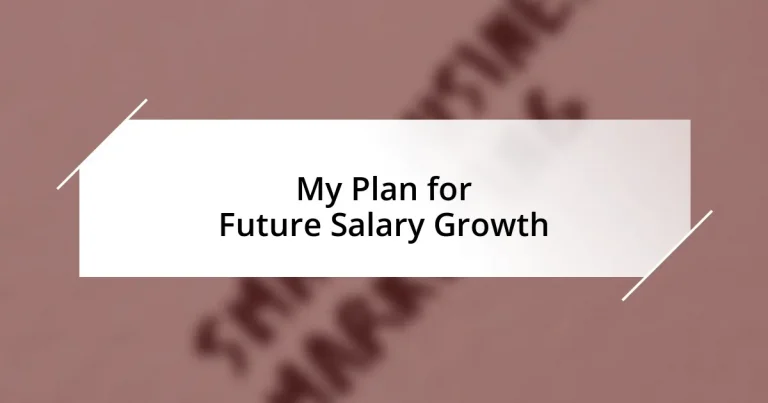Key takeaways:
- Salary trends vary with economic conditions and can significantly impact career decisions and aspirations.
- Identifying and developing in-demand skills is crucial for aligning salary growth with market needs.
- Setting realistic salary goals and breaking them into smaller milestones aids in maintaining motivation and adaptability.
- Active networking and seeking feedback from mentors enhance career opportunities and foster growth through collaboration.
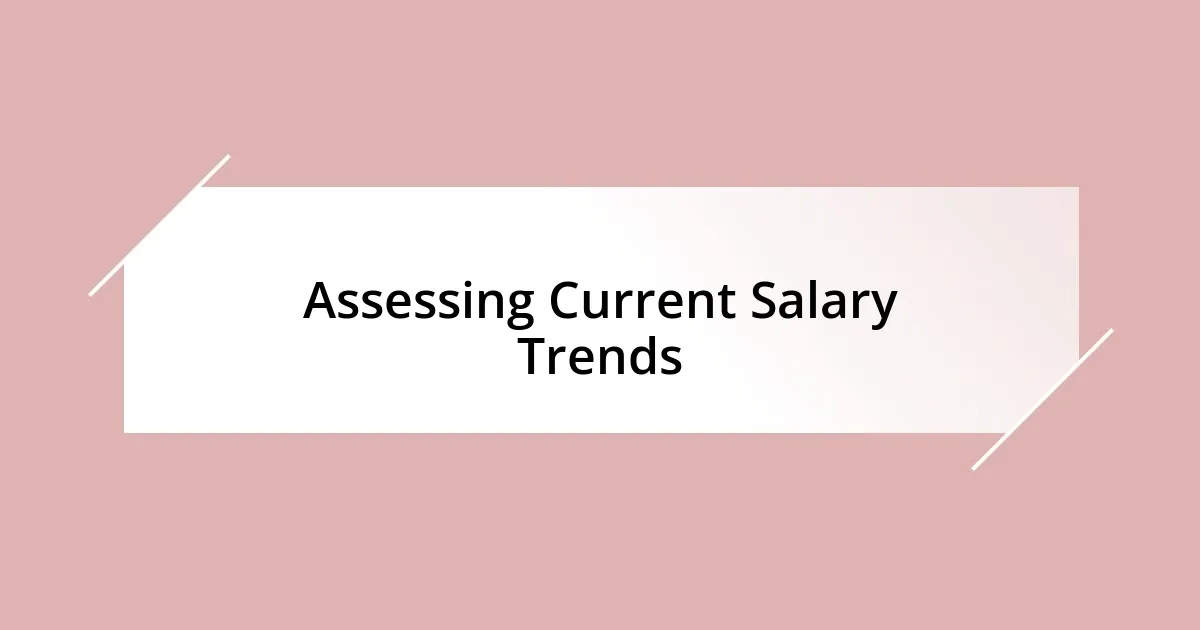
Assessing Current Salary Trends
As I’ve navigated my career, one thing became crystal clear: salary trends fluctuate with economic conditions and industry demands. For instance, when I switched jobs during a tech boom, I noticed my offers were significantly higher than a few years prior. It begs the question—what do these trends reveal about the job market, and how can they influence our aspirations?
Reflecting on my own salary growth journey, I remember feeling a mix of anxiety and excitement every time I reviewed reports on salary trends. I often wondered if I was on track with my peers or if I was undervaluing my skills. In such moments, it’s crucial to take a step back and assess if my expectations align with the industry benchmarks that are constantly evolving.
When I look at my friends who’ve jumped between roles, I can see how closely salary trends impacted their choices. Some turned to freelance work for better pay, while others sought additional certifications to stay competitive. This raises the essential point: how aware are you of your industry’s salary landscape, and are you ready to adapt your plan to leverage those insights?
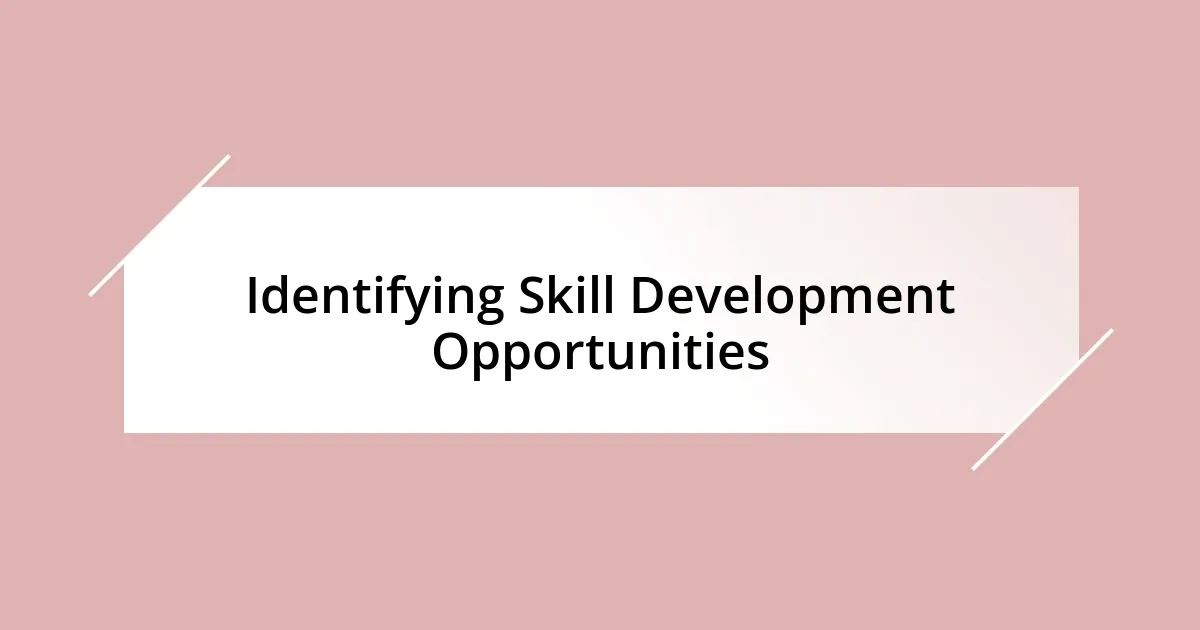
Identifying Skill Development Opportunities
Identifying skill development opportunities is essential for not only enhancing your expertise but also for ensuring your salary growth aligns with market needs. During my own journey, I took the time to evaluate which skills were in high demand in my industry. I remember attending a networking event where I was surprised to learn that many professionals were seeking proficiency in data analytics. That moment motivated me to enroll in an online course, which ultimately made a significant difference in my career.
To pinpoint the right skill development opportunities, consider the following strategies:
- Industry Research: Follow industry reports and blogs to learn what skills are becoming essential.
- Networking: Engage with peers and mentors to seek advice on valuable skills and training programs.
- Self-Assessment: Reflect on your current skills and identify gaps that could benefit your career path.
- Feedback: Ask for performance reviews or feedback from supervisors to gain insights on areas for improvement.
- Job Descriptions: Review job postings in your field to identify recurring skills that employers desire.
Identifying these opportunities might be a game-changer in your quest for future salary growth, just as it was for me.
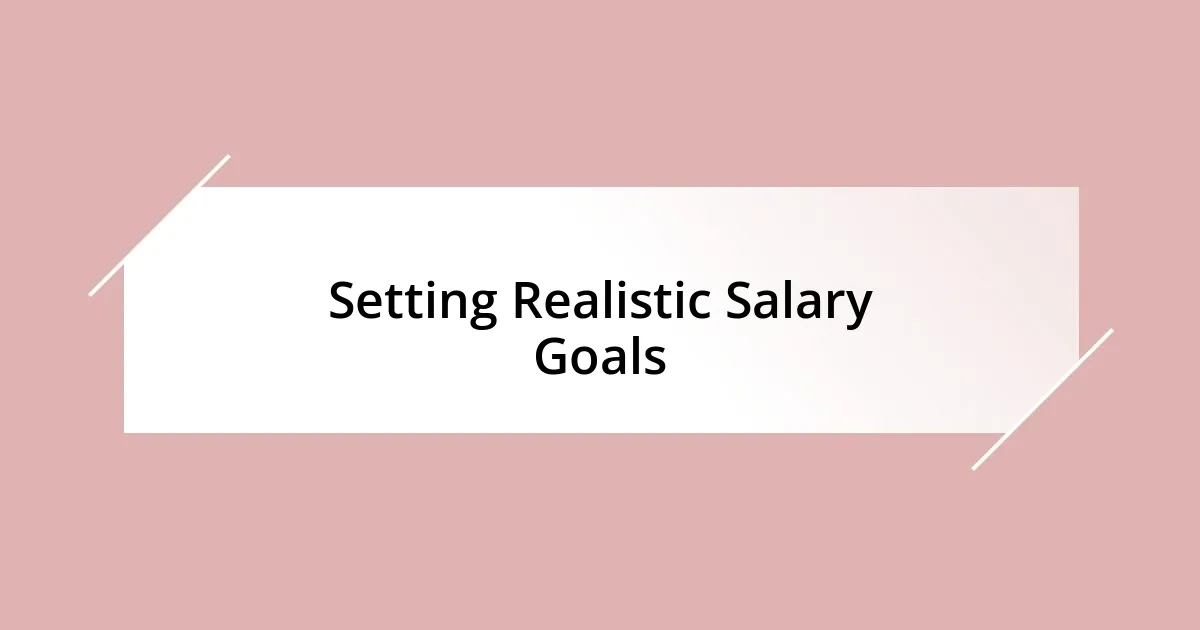
Setting Realistic Salary Goals
Setting realistic salary goals requires a clear understanding of both personal ambitions and market expectations. I remember a time when I set an ambitious salary goal after getting a promotion, fueled by excitement but lacking realistic research. The truth hit me hard when I compared my aspirations against actual data; I realized I had overestimated what was feasible in my industry. Knowing when to aim high is essential, but so is grounding those aspirations in reality.
While reflecting on my journey, I found that adjusting my salary goals became easier once I started breaking them down into smaller milestones. For example, instead of aiming for a significant leap right away, I focused on incremental increases, which felt much more attainable. This approach relieved the pressure and allowed me to celebrate smaller achievements along the way. Every time I achieved a mini-goal, it boosted my confidence and further clarified my long-term aspirations.
Additionally, it’s vital to consider external factors that may affect salary growth, like economic shifts or company performance. I recall a period when my company faced challenges, and I had to reassess my financial expectations. Despite the setback, it was an invaluable lesson about market dynamics and the importance of staying adaptable. I learned that flexibility in my planning is just as crucial as ambition.
| Strategy | Key Insight |
|---|---|
| Research Industry Standards | Stay informed on salary trends to set achievable goals. |
| Break Down Goals | Focus on small, attainable milestones to build momentum. |
| Be Adaptable | Adjust goals based on economic conditions and personal experiences. |
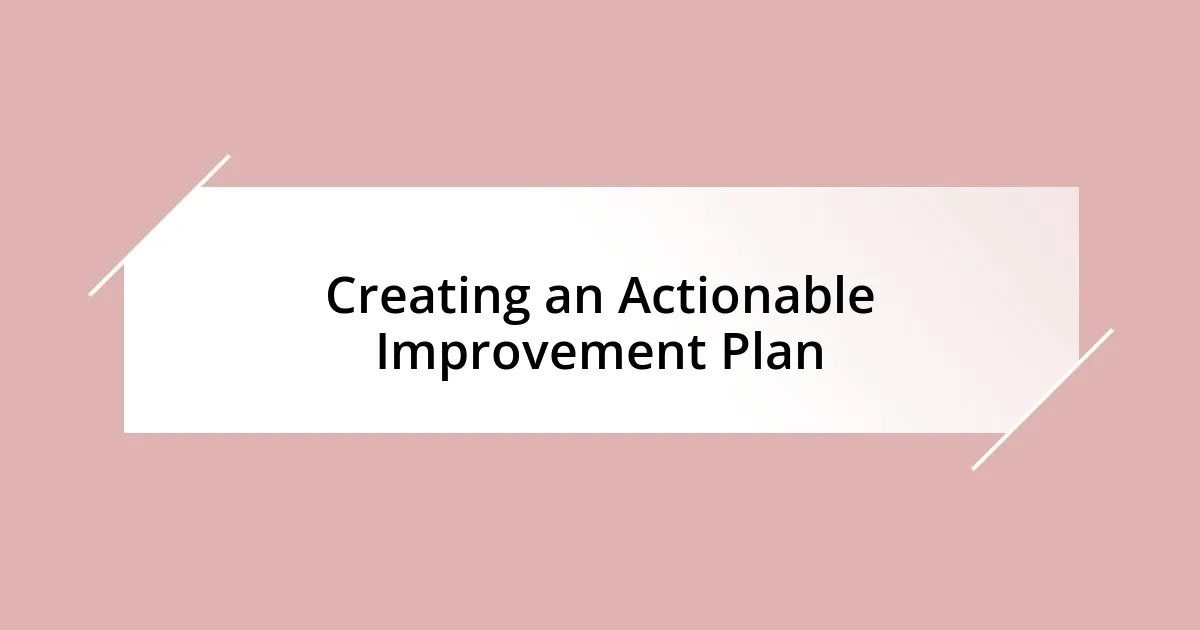
Creating an Actionable Improvement Plan
Creating an actionable improvement plan begins with a clear roadmap of the skills you want to develop. I remember when I decided to take a proactive approach; I jotted down the specific competencies that would elevate my career trajectory. Have you ever felt overwhelmed by the sheer amount of information out there? I certainly did, until I recognized that focusing on just two or three relevant skills could be the game changer I needed.
Next, it’s essential to set measurable objectives for your improvement plan. For instance, I once committed to completing an online course in digital marketing within three months. By breaking that down into weekly modules, I not only stayed organized but also felt a sense of accomplishment as I ticked off each section. This method of pacing made the process less daunting and much more enjoyable.
Lastly, accountability can make or break your improvement journey. I found that sharing my goals with a mentor created an added layer of commitment. Have you considered who might hold you accountable? Just like a workout buddy keeps you on track, a mentor can provide invaluable support and motivation as you chase those salary growth aspirations.
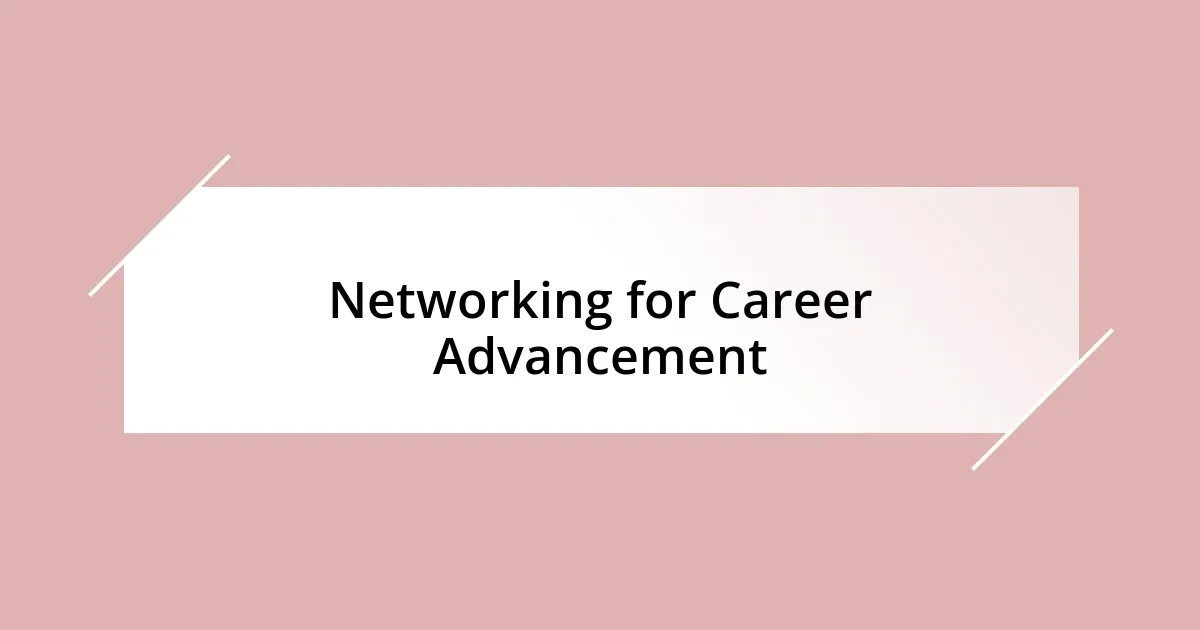
Networking for Career Advancement
When I think about networking for career advancement, some of my most valuable connections stem from casual conversations at industry events. I still remember attending a conference where I struck up a chat with a fellow attendee who eventually became a crucial ally in my career. Have you ever noticed how a single connection can open multiple doors? It’s fascinating how the right relationship at the right time can lead to unexpected opportunities.
Building a network isn’t just about exchanging business cards; it’s about cultivating genuine relationships. I once made a point to follow up with someone I met over coffee, and that simple act transformed a fleeting encounter into an authentic friendship. By checking in regularly and offering assistance when I could, I found a mentor in her who guided me through challenging career decisions. It’s amazing how nurturing that connection not only enhanced my professional knowledge but also helped me navigate salary discussions with greater confidence.
I’ve also learned that being proactive in networking can yield impressive results. During a networking event, I took the leap to introduce myself to a senior leader in my field. Initially, it felt intimidating, but sharing my aspirations sparked a meaningful dialogue. Have you ever felt that thrill when someone recognizes your potential? From that brief interaction, I was invited to a project that boosted my visibility in the company. This experience reinforced my belief that on-the-spot networking could significantly impact my career trajectory.
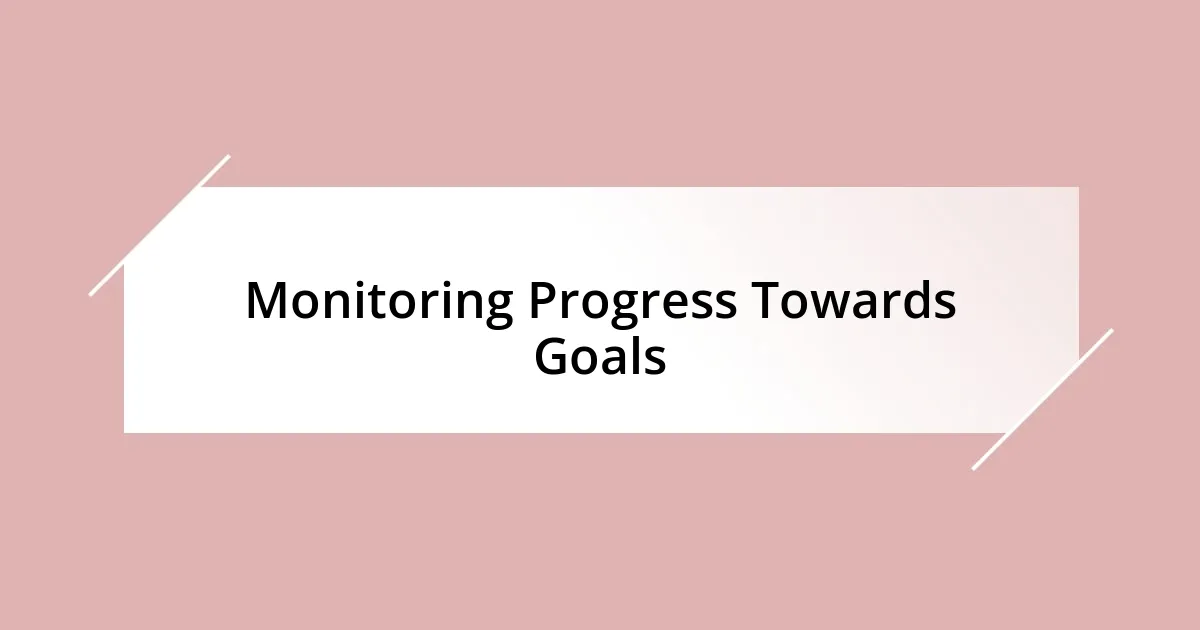
Monitoring Progress Towards Goals
When it comes to monitoring progress towards my salary growth goals, I’ve learned that regularly evaluating my achievements is crucial. I remember setting aside time at the end of each month to reflect on my progress. This simple practice not only kept me focused but also allowed me to recognize small wins that might have otherwise gone unnoticed. Can you think of a time when recognizing your progress motivated you to keep going? I certainly felt that boost every time I reviewed my accomplishments.
Another strategy I implemented is tracking my skill development through a dedicated journal. I’d jot down what I learned, how I applied it, and even the feedback received from colleagues. This habit not only provided clarity but also highlighted patterns over time. Have you ever noticed how writing can crystallize your thoughts? It’s like holding a mirror up to your journey, helping you gauge where you truly stand in relation to your goals.
Additionally, I find it helpful to set periodic check-ins with myself and my mentor. These discussions are more than just status updates; they serve as invaluable touchpoints for recalibrating my strategies. I vividly recall a session where I realized my original timeline for a certification was too aggressive. By adjusting it, I alleviated the stress of racing against the clock, ultimately leading to a more meaningful learning experience. Isn’t it interesting how a little adjustment can have such a significant impact on your trajectory? This ongoing dialogue not only keeps me accountable but also fuels my motivation to drive my career forward.
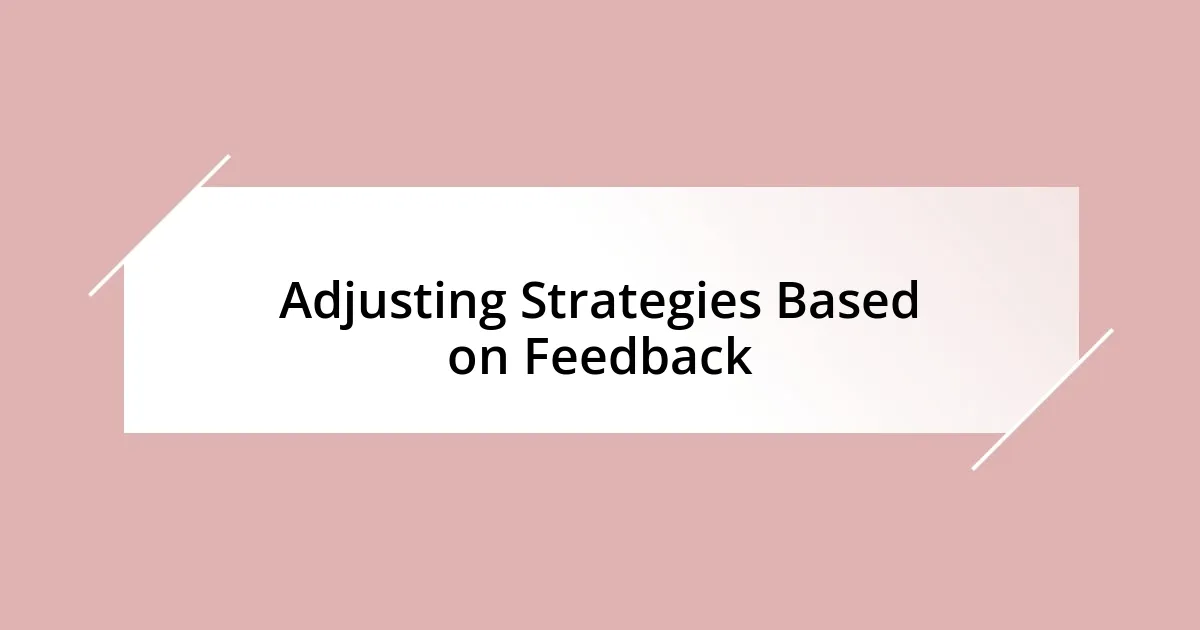
Adjusting Strategies Based on Feedback
Adjusting my strategies based on feedback has truly been an eye-opening journey. I remember a time when I eagerly presented a proposal to my manager, only to receive constructive criticism that initially stung. Instead of feeling defeated, I took it as a chance to refine my approach. Have you ever had feedback that made you reevaluate your methods? For me, embracing those moments has led to unexpected growth and better outcomes.
I actively seek out feedback from various sources, especially after completing a project. One memorable instance was receiving insights from a colleague who saw a different angle I hadn’t considered. By incorporating her suggestions, I not only improved the project but also strengthened our working relationship. This experience reminded me that feedback can be a powerful catalyst for collaboration. How often do you allow others to influence your work? I’ve found that being open to different perspectives enriches my strategy and propels my growth.
Lastly, I’ve learned that adjusting my strategies also means being flexible with my goals. There was a period when I focused solely on salary increments, but after a candid conversation with a mentor, I recognized the importance of aligning my skills with market demands. That shift in focus helped me develop a more sustainable growth path. Have you considered how your goals might evolve over time? Embracing this flexibility has allowed me to adapt my strategies effectively, ensuring I’m not just chasing numbers but building a fulfilling career.












